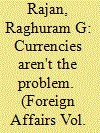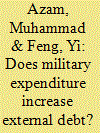|
|
|
Sort Order |
|
|
|
Items / Page
|
|
|
|
|
|
|
| Srl | Item |
| 1 |
ID:
192506


|
|
|
|
|
| Summary/Abstract |
This paper analyzes trends and factors of Chinese economic growth in recent years (2017-2022). It pays particular attention to the role of foreign trade and cross-border capital movement in China's economic development, as well as to the status of its debt position. It also draws a number of conclusions about prospects for the growth and evolution of China's economic development model.
|
|
|
|
|
|
|
|
|
|
|
|
|
|
|
|
| 2 |
ID:
101911


|
|
|
|
|
| Publication |
2011.
|
| Summary/Abstract |
The current debate over quantitative easing overlooks the important question of domestic economic strategy in both the developed and developing world. Put simply, consumers in industrial economies buy too much, and those in developing ones, too little.
|
|
|
|
|
|
|
|
|
|
|
|
|
|
|
|
| 3 |
ID:
155299


|
|
|
|
|
| Summary/Abstract |
This article empirically explores the effect of military spending on external debt, using a sample of ten Asian countries over the years from 1990 to 2011. The Hausman’s test suggests that the random-effects model is preferable; however, both random-effects and fixed-effects models are used in this research. The empirical results show that the effect of military spending on external debt is positive, while the effects of foreign exchange reserves and of economic growth on external debt are negative. For developing countries caught in security dilemma, military expenditure often requires an increase in external debt, which may affect economic development negatively.
|
|
|
|
|
|
|
|
|
|
|
|
|
|
|
|
| 4 |
ID:
152509


|
|
|
|
|
| Summary/Abstract |
Persistent renminbi (RMB) devaluation expectations are one of the greatest threats to China's macroeconomic stability. Market interventions backed by huge foreign exchange reserves and capital controls are not sufficient to eliminate the expectations of devaluation. Creating a market-based and flexible RMB exchange rate regime holds the key to the elimination of devaluation expectations. The present paper compares the pros and cons of several policy options, and proposes to introduce, as a transition to free floating, a new exchange rate regime pegged to a currency basket with a wide band. The new regime should be able to give the RMB exchange rate enough flexibility to eliminate devaluation expectations as well as prevent excessive overshooting. To ensure a smooth transition, the new regime needs to be supported by controlling cross-border capital flows.
|
|
|
|
|
|
|
|
|
|
|
|
|
|
|
|
| 5 |
ID:
186219


|
|
|
|
|
| Summary/Abstract |
The sanctions imposed by the G10 countries on financial institutions in Russia, including on its central bank, will come under scrutiny by emerging market central banks. This will help them build appropriate safeguards against disruptions to cross-border transactions and revise their investment mandates to reduce the risk of reserve asset freezes. Building new financial market infrastructure and cross-border payment systems, or strengthening existing ones, will become the priority of emerging global powers. The goal will be to build systems that support democratic governance mechanisms, have oversight arrangements involving the central banks of trusted countries, and promote fair and safe access to clearing and settlement under well-defined policy guidelines. The use of alternatives to the US dollar as the invoicing currency in international trade will gather momentum. Markets for energy and other commodities will be the change drivers. China has an important role to play.
|
|
|
|
|
|
|
|
|
|
|
|
|
|
|
|
| 6 |
ID:
140231


|
|
|
|
|
| Summary/Abstract |
Where policy has substantially increased central bank assets, the corresponding liabilities present an opportunity to increase the breadth, depth and liquidity of the government bond market. In China's case, transformed illiquid central bank liabilities could double or triple the stock of government bonds. Central bank liabilities can be transformed into government bonds either through the government's purchase of foreign exchange reserves held by the central bank or by the government overfunding its borrowing requirement and depositing the proceeds in the central bank. The overfunding approach is preferred if, for financial stability reasons, it is judged prudent to leave the central bank with sufficient resources to serve itself as lender of last resort in foreign currency to the banking system. In the case of China, public debt consolidation could also contribute to further liberalizing the Chinese banking system, wider international use of the renminbi and more balanced holdings of key currency government bonds.
|
|
|
|
|
|
|
|
|
|
|
|
|
|
|
|
| 7 |
ID:
090106


|
|
|
|
|
| Publication |
2009.
|
| Summary/Abstract |
The subprime mortgage crisis and the resultant inflationary monetary policy in the USA have left the Chinese economy subject to four risks in particular. First, China's exports to the USA might continue to decline. Second, in the medium term, the higher US inflation rate will lead to a weak dollar, which will negatively affect China's exports. Third, in the long term, when the US Federal Reserve decreases money supply to control inflation, the US economy might enter another recession, hurting China's exports further. Fourth, China's foreign exchange reserve assets might suffer heavy losses when the US inflation rate rises. Conventional foreign exchange investment strategies are insufficient for dealing with these four risks. Investment by China in the major US banks is suggested in the present paper. This strategy would mitigate if not eliminate all four risks. China could gain considerable financial returns on investments with only moderate risk.
|
|
|
|
|
|
|
|
|
|
|
|
|
|
|
|
|
|
|
|
|